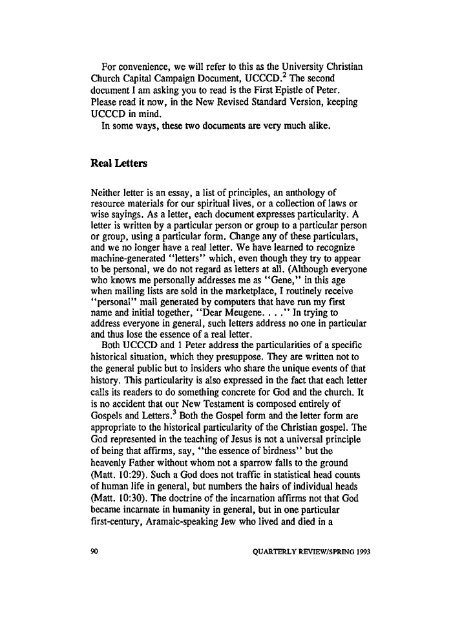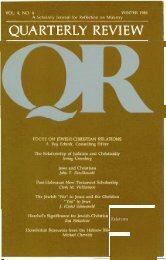TJieodore W. Jennings, Jr. The Meaning of ... - Quarterly Review
TJieodore W. Jennings, Jr. The Meaning of ... - Quarterly Review
TJieodore W. Jennings, Jr. The Meaning of ... - Quarterly Review
Create successful ePaper yourself
Turn your PDF publications into a flip-book with our unique Google optimized e-Paper software.
For convenience, we will refer to this as the University Christian<br />
Church Capital Campaign Document, UCCCD. 2<br />
<strong>The</strong> second<br />
document I am asking you to read is the First Epistle <strong>of</strong> Peter.<br />
Please read it now, in the New Revised Standard Version, keeping<br />
UCCCD in mind.<br />
In some ways, these two documents are very much alike.<br />
Real Letters<br />
Neither letter is an essay, a list <strong>of</strong> principles, an anthology <strong>of</strong><br />
resource materials for our spiritual lives, or a collection <strong>of</strong> laws or<br />
wise sayings. As a letter, each document expresses particularity. A<br />
letter is written by a particular person or group to a particular person<br />
or group, using a particular form. Change any <strong>of</strong> these particulars,<br />
and we no longer have a real letter. We have learned to recognize<br />
machine-generated "letters" which, even though they try to appear<br />
to be personal, we do not regard as letters at all. (Although everyone<br />
who knows me personally addresses me as "Gene," in this age<br />
when mailing lists are sold in the marketplace, I routinely receive<br />
"personal" mail generated by computers that have run my first<br />
name and initial together, "Dear Meugene. . . In trying to<br />
address everyone in general, such letters address no one in particular<br />
and thus lose the essence <strong>of</strong> a real letter.<br />
Both UCCCD and 1 Peter address the particularities <strong>of</strong> a specific<br />
historical situation, which they presuppose. <strong>The</strong>y are written not to<br />
the general public but to insiders who share the unique events <strong>of</strong> that<br />
history. This particularity is also expressed in the fact that each letter<br />
calls its readers to do something concrete for God and the church. It<br />
is no accident that our New Testament is composed entirely <strong>of</strong><br />
Gospels and Letters. 3<br />
Both the Gospel form and the letter form are<br />
appropriate to the historical particularity <strong>of</strong> the Christian gospel. <strong>The</strong><br />
God represented in the teaching <strong>of</strong> Jesus is not a universal principle<br />
<strong>of</strong> being that affirms, say, "the essence <strong>of</strong> birdness" but the<br />
heavenly Father without whom not a sparrow falls to the ground<br />
(Matt. 10:29). Such a God does not traffic in statistical head counts<br />
<strong>of</strong> human life in general, but numbers the hairs <strong>of</strong> individual heads<br />
(Matt. 10:30). <strong>The</strong> doctrine <strong>of</strong> the incarnation affirms not that God<br />
became incarnate in humanity in general, but in one particular<br />
first-century, Aramaic-speaking Jew who lived and died in a<br />
90 QUARTERLY REVIEW/SPRING 1993












